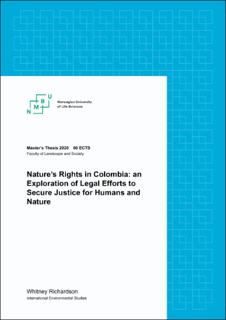| dc.description.abstract | Nature’s rights approaches are being developed as an alternative legal means to secure justice for nature and, oftentimes, for humans, too. As a nascent phenomenon, most studies examine nature’s rights as an eco-centric legal theory. This study fills a gap in academic literature by examining nature’s rights governance approaches which seek to secure justice for both humans and nature.
This study examines Colombia’s two seminal court-ordered nature’s rights approaches to determine to what degree they have satisfied their aims to secure justice for humans and nature simultaneously. Each case recognizes an ecosystem – the Atrato River Basin (est. 2016) and the Colombian Amazon (est. 2018) – as a legal subject with the rights to be protected, maintained, conserved, and restored. Developed as a remedy for human rights violations, both cases provide an opportunity to explore variations in nature’s rights approaches and the relationship between efforts to secure justice for humans and nature.
To meet the overall objective, I have conducted a qualitative analysis, using comparative, narrative, and thematic approaches to examine available research materials. Materials include primary data collected from interviews with those involved in the formation and implementation of the Atrato and Amazon court rulings. I also examined official progress reports and transcripts from Public Audiences reviewing compliance, additional government documents and gray literature (i.e., media coverage). Analysis was supported by reference to two fields of academic enquiry, environmental justice (justice between humans in nature) and ecological justice (justice for nature) theories. As such, I have sought to consider the strength of nature’s rights approaches as a means to secure justice for humans and nature.
Drawing from evidence regarding implementation efforts, I argue that the Atrato River Basin and Colombian Amazon nature’s rights approaches currently fall short of their aims to secure justice for both humans and nature. While both rulings contained some essential elements of both environmental and ecological justice theories, interpretation and implementation of the rulings have yet to enable justice and, in some cases, have perpetuated injustices.
Examination has identified some of the impeding factors influencing justice outcomes, characterized as a politics of neglect. Low levels of compliance in both cases evidences a permeating disregard for the significant, ongoing threats imposed on both humans and nature in the Atrato and Amazon regions. Both approaches emerged within an incompatible culture of impunity, noncompliance, and a militarized extractive complex, which remain the prime barriers to securing any justice.
Analysis of both approaches also suggests that efforts to secure justice for humans and nature may be ultimately compatible, as they share common opportunities (i.e., secure pathways to protect nature’s ecological health and interdependent human rights) and adversaries (i.e. militarized extractive complex). I conclude that environmental and ecological injustices are co-occurring symptoms of a broader injustice and, thus, require an intersectional justice approach to help overcome adversarial factors. This argument is supported by evidence gleaned from analyzing the approaches within their historical and contemporary contexts, against their aims to secure justice for both humans and nature. | en_US |

